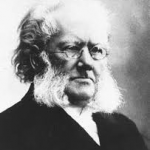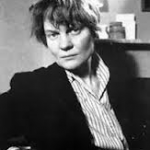 “There is a famous anecdote about an out-of-town tryout of the original production of A Streetcar Named Desire. Thornton Wilder was in attendance and remarked afterwards to Tennessee Williams that he thought Blanche DuBois was too complex a character for the theater. Tennessee is said to have replied, ‘People are complex, Thorn.’”
“There is a famous anecdote about an out-of-town tryout of the original production of A Streetcar Named Desire. Thornton Wilder was in attendance and remarked afterwards to Tennessee Williams that he thought Blanche DuBois was too complex a character for the theater. Tennessee is said to have replied, ‘People are complex, Thorn.’”
I read the above anecdote in the program notes as Jeanne and I waited at a local theater for Henrik Ibsen’s Hedda Gabler to begin.  What I know about the great Norwegian playwright has been gathered over the years from teaching in a team-taught course where my literature teammate has occasionally chosen one of Ibsen’s controversial and fascinating plays for the students to grapple with, ranging from An Enemy of the People to The Wild Duck and A Doll’s House. Ibsen’s penchant for ripping the veil off late nineteenth-century bourgeois Norwegian society, pushing his readers’ and audience’s face up against topics that decent people would just as soon not consider, and especially his willingness to populate his plays with female characters who explode the stereotypes of dutiful wife and devoted mother caused his plays to not only be banned in several countries during his lifetime
What I know about the great Norwegian playwright has been gathered over the years from teaching in a team-taught course where my literature teammate has occasionally chosen one of Ibsen’s controversial and fascinating plays for the students to grapple with, ranging from An Enemy of the People to The Wild Duck and A Doll’s House. Ibsen’s penchant for ripping the veil off late nineteenth-century bourgeois Norwegian society, pushing his readers’ and audience’s face up against topics that decent people would just as soon not consider, and especially his willingness to populate his plays with female characters who explode the stereotypes of dutiful wife and devoted mother caused his plays to not only be banned in several countries during his lifetime  (he was nicknamed “Ibscene”) but make them sound to a twenty-first century audience as if they were written yesterday. I probably read Hedda Gabler as an undergraduate, but this was the first time I had the chance to see it on stage and only the second Ibsen I had ever seen performed; reading in the program notes that the role of Hedda has been described as the “female Hamlet” raised my expectations even further.
(he was nicknamed “Ibscene”) but make them sound to a twenty-first century audience as if they were written yesterday. I probably read Hedda Gabler as an undergraduate, but this was the first time I had the chance to see it on stage and only the second Ibsen I had ever seen performed; reading in the program notes that the role of Hedda has been described as the “female Hamlet” raised my expectations even further.
Over the past few months I have been immersed in things Norwegian as I read through Jo Nesbø’s mystery series set in Oslo and environs. Nesbø is the hottest writer to come out of Scandinavia since Steig Larsson; I started his ten-volume-and-counting Harry Hole series in early summer and am currently plowing through Phantom, the ninth entry in the series. Were it not for my usual commitment to reading everything an author has written in the order written once I have discovered their work, I might not have made it this far— Nesbø’s incredible popularity has caused him to crank out books at a pace that outstrips consistent quality—but when he’s good, he’s very, very good. As with all of my favorite authors of mystery series, I particularly enjoy how the repeating characters become more real from book to book as I learn incrementally more about their history, their peccadilloes, their shortcomings, their successes, their relationships, their failures, their inner lives—in short, I enjoy observing them become more and more recognizably human. Because Tennessee Williams was right. People are complex.
Nesbø’s incredible popularity has caused him to crank out books at a pace that outstrips consistent quality—but when he’s good, he’s very, very good. As with all of my favorite authors of mystery series, I particularly enjoy how the repeating characters become more real from book to book as I learn incrementally more about their history, their peccadilloes, their shortcomings, their successes, their relationships, their failures, their inner lives—in short, I enjoy observing them become more and more recognizably human. Because Tennessee Williams was right. People are complex.
Nesbø and Ibsen both prefer shadow to light and seldom go far before revealing something dark and sinister lying beneath the surface of even the most banal and pleasant persons and circumstances. Hedda Gabler, a newlywed just returned from her honeymoon with her husband George, a newly minted PhD (philosophy, no less!) expecting a plum appointment at the local university, finds herself situated in a large new house ready to be furnished with whatever furniture she fancies. George is clearly infatuated with his beautiful new wife, who everyone describes (to her increasing annoyance) as “glowing.”  But appearances are deceiving; only a few minutes into the play we find that Hedda is complicated to the core. Another short essay in the program guide reports that Hedda has been described by critics as “sinister, degenerate, repellent, lunatic, a monster in the shape of a woman, with a soul too small even for human sin.” A bit over the top, perhaps, but she actually is just about all of that. But she is also charismatic, has a razor-sharp wit, crackles with energy, and as if by magic causes everyone in the room to dance to her tune.
But appearances are deceiving; only a few minutes into the play we find that Hedda is complicated to the core. Another short essay in the program guide reports that Hedda has been described by critics as “sinister, degenerate, repellent, lunatic, a monster in the shape of a woman, with a soul too small even for human sin.” A bit over the top, perhaps, but she actually is just about all of that. But she is also charismatic, has a razor-sharp wit, crackles with energy, and as if by magic causes everyone in the room to dance to her tune.
As I watched the play unfold on the stage fifteen feet away, I realized that Hedda is not necessarily a bad person bent on the destruction of everything she touches. In this performance she was brilliantly played with the energy of trapped animal, like a tiger or lion in a zoo cage pacing back and forth restlessly, looking everywhere for a way to escape, and devouring everything unfortunate enough to fall within her reach. She finds herself in a world in which the only acceptable roles for a woman are roles that she not only would reject if given the opportunity but that she also knows she is completely unsuited for.  In a twisted version of Socrates’ observation that some lives are not worth living, Hedda strikes out more and more desperately as she feels the walls closing in. When there is no more room to move or breathe, she makes the only choice available and dies rather than living under these circumstances.
In a twisted version of Socrates’ observation that some lives are not worth living, Hedda strikes out more and more desperately as she feels the walls closing in. When there is no more room to move or breathe, she makes the only choice available and dies rather than living under these circumstances.
Two sets of sixteen freshmen and I encountered another trapped human being the next day after I saw Hedda Gabler. These Monday seminars were the culmination of New Testament week, in which the students had already read Mark for a setup lecture; the assignment for seminar was Luke, Acts, and Romans. We spent the bulk of both seminars considering various passages in both Luke and Acts where the very clear requirements of following Jesus set the behavior bar so high that clearly no normal human being could reach it. Iris Murdoch once commented that it would have made sense if in the Sermon on the Mount Jesus had said something like  “Be ye therefore slightly improved,” but he didn’t. Instead he said “Be ye therefore perfect, as your Heavenly Father is perfect.” My mostly parochial school educated freshmen, many of whom had been taught from a young age that the Christian life is about trying to be a good person as often as possible, were shocked and disturbed when they encountered what the texts actually say. Even at eighteen or nineteen years old, each of them had enough life experience with themselves and other human beings to know that the gospel standard is one that is impossible for the flawed creatures that we are to meet.
“Be ye therefore slightly improved,” but he didn’t. Instead he said “Be ye therefore perfect, as your Heavenly Father is perfect.” My mostly parochial school educated freshmen, many of whom had been taught from a young age that the Christian life is about trying to be a good person as often as possible, were shocked and disturbed when they encountered what the texts actually say. Even at eighteen or nineteen years old, each of them had enough life experience with themselves and other human beings to know that the gospel standard is one that is impossible for the flawed creatures that we are to meet.
No one has ever described the human predicament more effectively than Paul at the end of Romans 7—I took the students there toward the end of seminar.
What I do, I do not understand. For I do not do what I want, but I do what I hate . . . For I know that good does not dwell in me, that is, in my flesh. The willing is ready at hand, but doing the good is not. For I do not do the good I want, but I do the evil I do not want . . . Wretched man that I am! Who will rescue me from this body of death?
Hedda found herself trapped in circumstances in which she could not flourish, grow, survive, or even breathe. Paul finds himself in the same situation, but with much greater scope. Knowing what must or should be done and finding myself completely incapable of doing it. Bottom line, this is the human condition. No wonder we often strike out in frustration and anger at whatever is within reach. However we came to be in this predicament, we cannot work or will our way out of it.
Then in a masterful reversal of just a few lines, Paul provides a way out so compelling that it is hardly to be believed, a way whose energy coincides with the hope and promise that is at the heart of Advent that makes its welcome yearly appearance in a couple of weeks.
Now there is no condemnation for those who are in Christ Jesus. For the law of the spirit of life in Christ Jesus has made me free from the law of sin and death. For God has done what the law could not do: by sending his own Son . . .
For me, it is this hope and promise–fulfilled by the incarnation–that both uniquely defines the Christian faith and can keep a flawed, seriously damaged creature from descending into Paul’s despair or Hedda’s destructive rage. For every frustrated “I can’t do this!” there is an “Of course you can’t. But help is on the way.”












